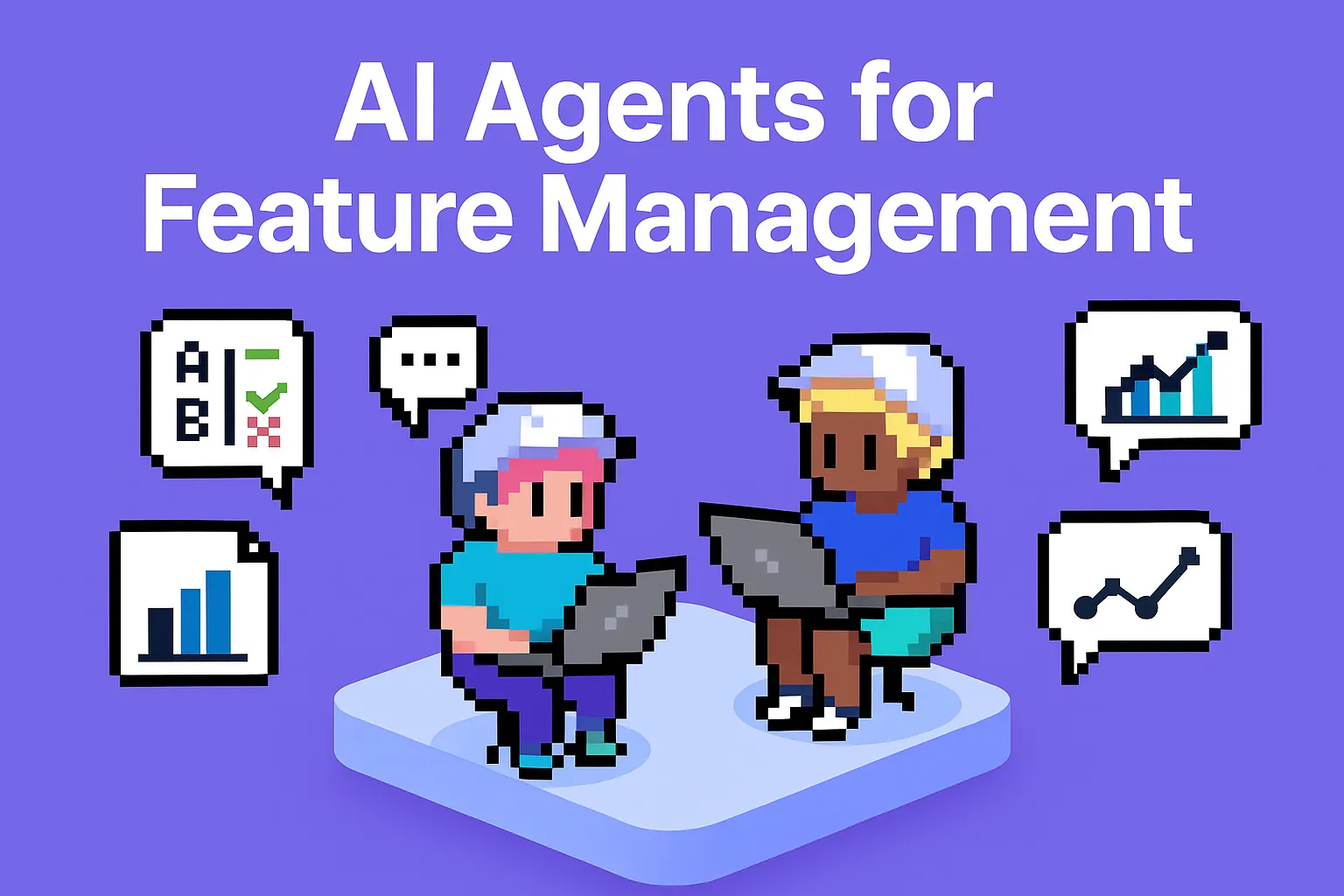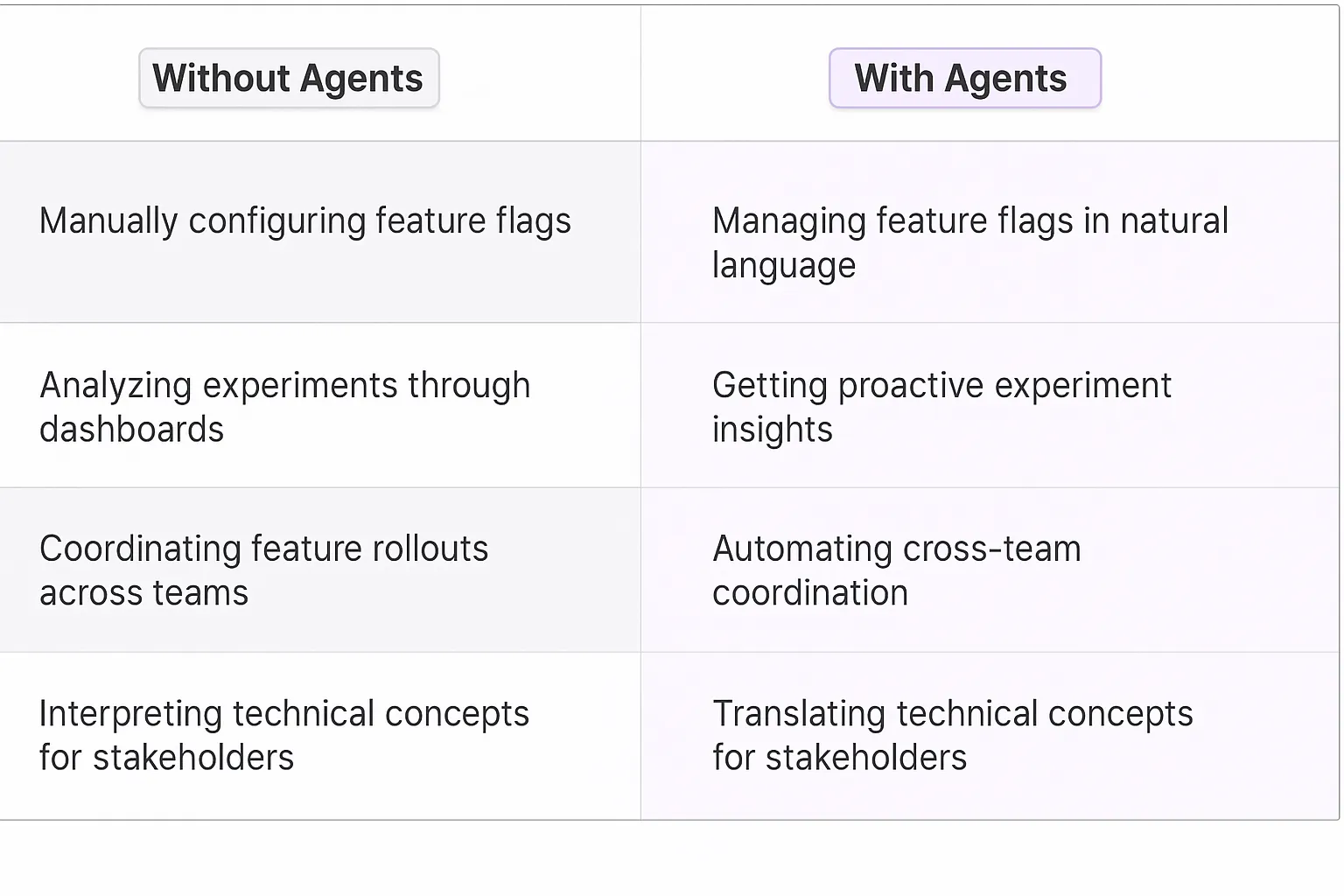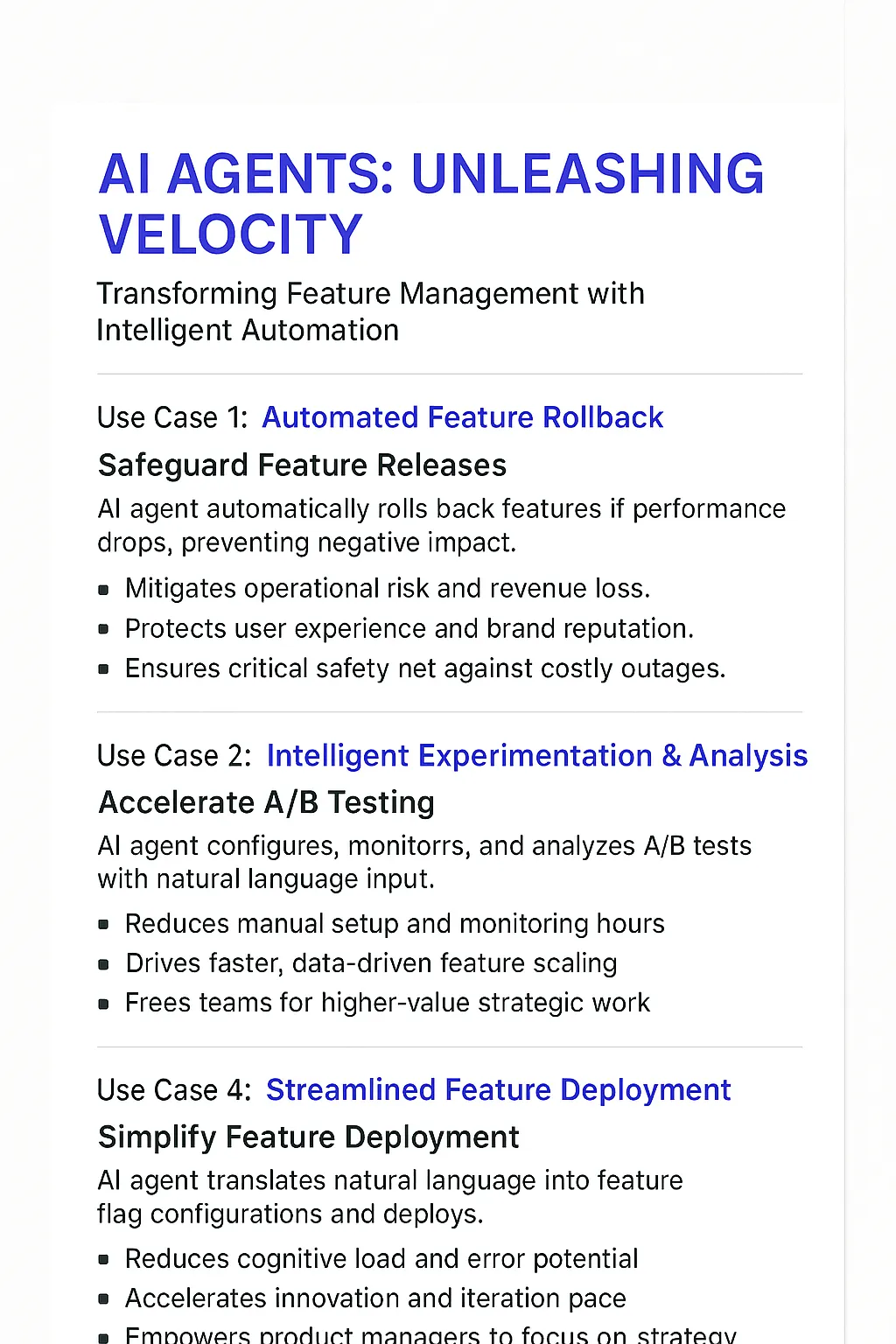Split.io
Understanding Split.io's Feature Management Platform
What is Split.io?
Split.io is a feature flag management platform that enables teams to control software releases through feature flags and measure their impact through experimentation. The platform provides sophisticated tools for gradual rollouts, A/B testing, and user targeting, helping organizations deliver software more safely and gather data about feature performance.
Key Features of Split.io
- Feature flag management across multiple environments
- Advanced targeting and user segmentation capabilities
- Real-time metrics and analytics for feature performance
- A/B testing and experimentation tools
- Integration with major development platforms and workflows
- Robust APIs for programmatic control and automation
This comprehensive platform empowers product managers and development teams to make data-driven decisions about feature releases while maintaining control over user experiences.

Benefits of AI Agents for Split.io
What would have been used before AI Agents?
Split.io traditionally required developers and product managers to manually configure feature flags, analyze experiment results, and make data-driven decisions through dashboard navigation and command line interfaces. Teams spent countless hours writing queries, interpreting data, and coordinating across departments to implement feature rollouts and A/B testing.
What are the benefits of AI Agents?
AI Agents transform how teams interact with Split.io's feature management platform in several key ways:
- Natural language feature flag management - Instead of navigating complex UIs or writing code, teams can create, modify and roll out feature flags through simple conversations. The AI understands context and handles the technical implementation automatically.
- Proactive experiment insights - Rather than manually analyzing dashboards, AI Agents continuously monitor experiments and surface statistically significant findings. They identify patterns and anomalies that humans might miss and explain the implications in clear business terms.
- Automated rollback protection - The AI can detect negative impacts from feature releases in real-time and automatically roll back changes before they affect users at scale. This creates a safety net that previously required constant human monitoring.
- Cross-team coordination - AI Agents bridge the gap between product, engineering, and data teams by translating technical concepts and metrics into relevant insights for each stakeholder. They maintain a unified view while speaking each team's language.
- Contextual documentation - Instead of digging through docs, teams can ask the AI specific questions about Split.io's capabilities and get relevant, contextual answers that incorporate their unique setup and use cases.
The shift from manual feature management to AI-enhanced workflows fundamentally changes how quickly teams can experiment and iterate. What used to take days or weeks of coordination can now happen in minutes through natural conversations with digital teammates that understand both the technical and business context.

Potential Use Cases of AI Agents with Split.io
Feature Flag Management
AI Agents can monitor and analyze feature flag performance in Split.io, providing real-time insights on user engagement and system stability. They track key metrics across different user segments, identifying patterns that humans might miss in complex deployment scenarios.
A/B Testing Analysis
Digital teammates excel at processing vast amounts of A/B test data from Split.io experiments. They can analyze conversion rates, user behavior patterns, and performance metrics across different variations, delivering actionable insights without manual data crunching.
Release Management
AI Agents can orchestrate gradual rollouts by monitoring system health metrics and user feedback. When issues arise, they can automatically pause rollouts or trigger rollbacks based on predetermined thresholds, maintaining system stability during feature releases.
User Segmentation Optimization
Through continuous analysis of user behavior data, AI Agents refine segmentation strategies in Split.io. They identify high-value user segments and recommend targeting adjustments based on engagement patterns and conversion metrics.
Performance Monitoring
AI Agents continuously monitor application performance monitoring metrics tied to feature flags. They detect anomalies, correlate issues with specific features, and generate detailed reports highlighting potential optimization opportunities.
Compliance and Documentation
Digital teammates maintain detailed logs of feature flag changes, ensuring compliance with regulatory requirements. They generate comprehensive documentation of testing procedures, feature rollouts, and impact assessments automatically.
Cross-Team Coordination
AI Agents facilitate communication between development, product, and marketing teams by providing centralized updates on feature experiments and rollouts. They ensure all stakeholders stay informed about test results and deployment progress.
Risk Assessment
Through pattern recognition and historical data analysis, AI Agents evaluate potential risks associated with new feature deployments. They provide probability assessments for various outcomes and recommend mitigation strategies based on past experiences.
Impact on Development Workflows
The integration of AI Agents with Split.io transforms feature management from a manual, time-intensive process into a data-driven, automated workflow. Development teams gain deeper insights into feature performance while reducing the cognitive load of managing complex rollouts and experiments.
These digital teammates serve as a force multiplier for engineering teams, handling routine monitoring and analysis tasks while surfacing critical insights that drive better decision-making. The result is faster, more confident feature deployments with reduced risk and improved outcomes.

Industry Use Cases
Split.io's AI agents transform feature flagging and experimentation from a technical task into a strategic advantage across multiple sectors. These digital teammates integrate deeply into development and product teams, bringing data-driven insights to feature releases and A/B testing decisions.
The real power emerges when AI agents analyze feature performance patterns across different user segments, providing nuanced recommendations that human teams might miss. For product managers, this means moving beyond basic flag management to sophisticated, targeted rollout strategies. Engineering teams gain a proactive partner that monitors feature health and suggests optimization opportunities based on real-time user behavior.
From enterprise SaaS platforms to consumer mobile apps, organizations leverage these AI capabilities to make smarter decisions about feature deployment. The agents' ability to process vast amounts of usage data and identify subtle patterns helps teams move faster while reducing the risk of problematic releases.
What makes this particularly compelling is how the AI adapts its analysis and recommendations based on each industry's unique metrics and success criteria. Whether optimizing for engagement in media apps or conversion in e-commerce platforms, these digital teammates provide contextually relevant insights that drive meaningful business outcomes.
Gaming Industry: Feature Flags and AI-Driven Player Experience
Gaming studios face intense pressure to deliver flawless player experiences while continuously shipping new features. Split.io's AI capabilities transform how gaming companies handle feature releases and player engagement through sophisticated feature flagging.
Take a multiplayer battle royale game with millions of daily active users. The development team needs to roll out a new matchmaking system that pairs players based on skill level, play style, and connection quality. Traditional deployment would risk disrupting the entire player base if issues arise.
Split.io's AI agent analyzes player behavior patterns, server loads, and matchmaking data in real-time. It gradually rolls out the new system to specific player segments, starting with 5% of users in low-stakes casual matches. The AI monitors key metrics like queue times, match quality scores, and player retention rates.
When the data shows positive results - like 20% faster queue times and 15% higher match satisfaction - the AI automatically expands the rollout to competitive modes. If issues emerge, like increased lag in certain regions, the system immediately rolls back changes for affected players while maintaining the improvement for others.
This granular control through AI-powered feature flags means gaming studios can:
- Test features with precise player segments based on skill level, region, or play patterns
- Protect competitive integrity during tournament seasons
- Roll back problematic changes without full service disruption
- Gather rich player behavior data to inform future development
The result is a more stable, engaging gaming experience that keeps players coming back while giving developers the confidence to innovate rapidly. This approach has become essential for modern game development, where a single poor feature rollout can impact millions of players within minutes.
E-commerce: AI-Powered Feature Testing for Revenue Optimization
Online retailers operate in an environment where small UI changes can mean millions in revenue impact. Split.io's AI capabilities transform how e-commerce companies deploy and test new features across their digital storefronts.
A major online marketplace faces the challenge of optimizing their product recommendation engine during peak shopping seasons. With millions of daily transactions and constantly shifting consumer behaviors, traditional A/B testing falls short of capturing nuanced shopping patterns.
Split.io's AI agent monitors real-time purchase data, cart abandonment rates, and user flow patterns. It orchestrates sophisticated feature releases by segmenting users based on shopping history, geography, and device types. The system might start by testing new recommendation algorithms with 10% of mobile shoppers in specific product categories.
The AI continuously analyzes key metrics like average order value, cross-category purchases, and conversion rates. When the data reveals that the new recommendation engine drives a 25% increase in cross-category purchases among mobile users, the system gradually expands the rollout while monitoring for any negative impacts on site performance or user experience.
E-commerce teams using AI-powered feature flags gain critical advantages:
- Target feature releases to specific customer segments based on purchase history
- Protect high-value shopping experiences during peak seasons
- Instantly revert problematic changes without disrupting the entire platform
- Generate detailed insights on how features impact purchasing behavior
This sophisticated approach to feature testing has become essential for modern e-commerce platforms, where the cost of a failed deployment during peak shopping hours can result in substantial revenue loss. The combination of AI intelligence with granular feature control creates a safer path to innovation in high-stakes retail environments.
Considerations and Challenges
Implementing Split.io AI agents requires careful planning around several key technical and operational factors. The complexity stems from both the integration requirements and the need to maintain consistent feature flag management across AI agent interactions.
Technical Challenges
Split.io's feature flagging system introduces specific technical hurdles when integrating with AI agents. The agent needs robust error handling for scenarios where feature flags change mid-conversation or become unavailable. Authentication and permission scoping require precise configuration to prevent the agent from accessing unauthorized feature flags or making unwanted modifications.
Data consistency becomes critical when the AI agent interacts with Split.io's analytics. The agent must maintain accurate tracking of feature flag impacts while avoiding duplicate or missing data points that could skew experiment results. This requires implementing proper event tracking and ensuring the agent correctly attributes user interactions to the right experiments.
Operational Challenges
Teams often struggle with maintaining clear ownership boundaries between AI agents and human operators in Split.io. Questions arise around who controls feature flag changes, who monitors experiment results, and who has final authority on flag decisions. Creating clear protocols for when agents can autonomously adjust flags versus when they need human approval becomes essential.
Version control and change management present another layer of complexity. As AI agents evolve, their interactions with Split.io's feature flag system must remain backwards compatible. Teams need robust testing processes to verify that agent updates don't break existing feature flag logic or experiment configurations.
The learning curve for teams can be steep, requiring deep knowledge of both AI agent capabilities and Split.io's architecture. Documentation must be comprehensive yet accessible, covering both technical integration details and operational best practices for managing the AI agent's role in feature experimentation.
Security Considerations
Security becomes paramount when AI agents have access to feature flag controls. Teams must implement strict access controls, audit logging, and monitoring to prevent unauthorized flag changes. The agent's API tokens and credentials need careful management with regular rotation schedules and immediate revocation capabilities if compromised.
Rate limiting and throttling mechanisms protect against accidental or malicious rapid feature flag changes by the AI agent. Teams should establish clear boundaries around which flags the agent can modify and implement approval workflows for sensitive changes.
AI-Enhanced Feature Management: The Future of Software Delivery
The integration of AI Agents with Split.io represents a significant evolution in feature management and experimentation. These digital teammates remove traditional bottlenecks in the development process, enabling teams to move faster while maintaining control and insight. As organizations continue to embrace data-driven development, the combination of AI intelligence with Split.io's feature control capabilities becomes increasingly valuable for delivering better software experiences.
The real power lies in how AI Agents transform technical feature management into strategic advantage. They bridge the gap between raw data and actionable insights, helping teams make better decisions about feature releases while reducing operational overhead. This shift from manual processes to AI-enhanced workflows marks a fundamental change in how modern software teams operate and innovate.













